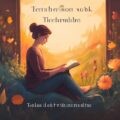In today’s fast-paced world, stress has become an unavoidable part of our lives. While it is impossible to eliminate stress entirely, we can certainly manage it better with the right tools. One of the most effective ways to cope with stress is by reading books that offer practical advice, mindfulness techniques, and therapeutic exercises. Here, we have compiled a list of the best stress relief books to help you find peace and tranquility.
1. The Power of Now by Eckhart Tolle
The Power of Now is a groundbreaking book by Eckhart Tolle that emphasizes the importance of living in the present moment. By focusing on the ‘now,’ Tolle argues that we can free ourselves from the tyranny of our thoughts and reduce stress. This book provides practical exercises and insightful wisdom to help readers achieve a more mindful and stress-free life.
2. The Anxiety and Phobia Workbook by Edmund J. Bourne
This comprehensive workbook offers tools and strategies to manage anxiety and phobias. It includes relaxation techniques, cognitive behavioral therapy (CBT) exercises, and tips for overcoming negative thought patterns. With its step-by-step approach, The Anxiety and Phobia Workbook serves as an excellent guide for anyone looking to reduce stress and improve their mental health.
3. The Relaxation and Stress Reduction Workbook by Martha Davis, Elizabeth Robbins Eshelman, and Matthew McKay
As one of the most popular books on stress management, The Relaxation and Stress Reduction Workbook provides a variety of techniques to help readers relax and reduce stress. From deep breathing exercises to progressive muscle relaxation, this book covers a wide range of methods to suit different needs and preferences.
4. The Joy of Missing Out: Live More by Doing Less by Tonya Dalton
In The Joy of Missing Out, productivity expert Tonya Dalton challenges the modern obsession with busyness. She encourages readers to embrace a more intentional and stress-free lifestyle by focusing on what truly matters. This book offers practical tips for simplifying your life, setting boundaries, and finding joy in the present moment.
5. Wherever You Go, There You Are by Jon Kabat-Zinn
Jon Kabat-Zinn, a pioneer in mindfulness-based stress reduction (MBSR), shares his insights in Wherever You Go, There You Are. This book introduces readers to the principles of mindfulness and provides practical exercises to incorporate mindfulness into daily life. By fostering a greater awareness of the present moment, readers can reduce stress and improve their overall well-being.
6. The Little Book of Hygge: Danish Secrets to Happy Living by Meik Wiking
Hygge, the Danish concept of coziness and comfort, has gained worldwide popularity as a way to reduce stress and increase happiness. In The Little Book of Hygge, Meik Wiking explores the elements of hygge and offers tips for incorporating this stress-relieving practice into your daily life. From creating a cozy home environment to enjoying simple pleasures, this book provides a delightful guide to achieving a more relaxed and contented life.
FAQ
1. What are some key benefits of reading stress relief books?
Reading stress relief books can provide numerous benefits, including gaining practical strategies to manage stress, improving mindfulness, fostering relaxation, and offering a sense of comfort and support. These books often include exercises and techniques that readers can apply in their daily lives to reduce stress and improve overall well-being.
2. How do mindfulness techniques in these books help with stress relief?
Mindfulness techniques help individuals focus on the present moment, which can reduce anxiety and stress. By paying attention to thoughts and feelings without judgment, readers can develop a greater sense of awareness and control over their stress responses. These techniques often include meditation, deep breathing, and mindful movement.
3. Can these books be helpful for severe anxiety or depression?
While stress relief books can be beneficial for managing mild to moderate stress and anxiety, they may not be sufficient for severe anxiety or depression. It is important for individuals experiencing significant mental health challenges to seek professional help from a therapist or psychiatrist. These books can complement professional treatment but should not replace it.
4. Are there any specific books for children or teenagers to help them manage stress?
Yes, there are several books designed specifically for children and teenagers to help them manage stress. Titles such as Mindfulness for Teen Anxiety by Christopher Willard and Breathing Makes It Better by Christopher Willard and Wendy O’Leary provide age-appropriate strategies and exercises to help young readers cope with stress and anxiety.
5. How can I incorporate the lessons from these books into my daily routine?
To incorporate the lessons from stress relief books into your daily routine, start by setting aside time each day to practice the techniques you learn. This could include a few minutes of mindfulness meditation, journaling, or practicing deep breathing exercises. Consistency is key, so try to make these practices a regular part of your day to experience the full benefits.









